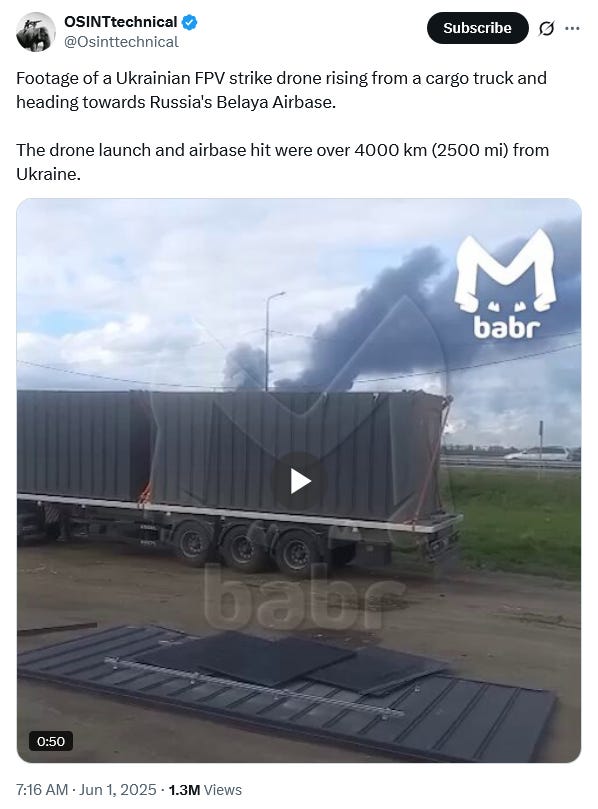Ukraine's Drones Fly Deep and Strike Hard
Peace Talks On Edge After Ukraine's Drones Strike Russian Bases
War always comes at a cost, even for Vladimir Putin. Ukraine’s latest wave of drone attacks is proving that in dramatic fashion.
Ukraine claims to have hit more than 40 Russian bomber planes at a number of military airbases, in one of its most audacious drone attacks since the war began.
Sources from Ukraine's security service, SBU, told the BBC strategic bombers were "burning en masse" in an operation named "Spider's Web", personally overseen by President Volodymyr Zelensky.
Several things are remarkable about this particular series of drone attacks.
Deep Penetration Into Russian Territory
Ukraine has succeeded in striking Russian airbases as far away as Murmansk and Irkutsk Oblasts, literally on the other side of Russia from Ukraine.
ZeroHedge is reporting that the Russian Ministry of Defense has confirmed drone strikes at several airbases across Russia.
Affected airfields reportedly include:
Murmansk Oblast
Irkutsk Oblast
Ivanovo Oblast
Ryazan Oblast
Amur Oblast
As noted with some of the released drone footage, Belaya Airbase is over 2500 miles away from Ukrainian territory.
Regardless of the measure of damage actually done—which reports indicate is significant—the drone penetration is a massive failure of Russian defenses, both aerial and terrestrial.
Not only were the drones able to strike airbases which house Russia’s strategic bomber forces (part of Russia’s nuclear weapons posture), but several of the launches involved covert penetrations deep into Russian territory.
Russian Logistics Impacted
While the headline casualty reports center on Russia’s strategic bomber fleet, Ukraine has also succeeded in destroying two railway bridges in Kursk and Bryansk Oblasts.
Disrupting rail traffic in these regions is likely to make Russia’s efforts to prepare a reported planned offensive against Sumy that much more difficult.
Peace Talks Set For Tomorrow
The extent of the reported damage alone makes the drone strikes militarily significant, but they also come one day before Moscow and Kyiv are slated to begin a second round of peace talks in Istanbul.
The line being reported out of the Kremlin is that Putin wants to end the war, but is not prepared to seek “peace at any price.”
President Vladimir Putin's conditions for ending the war in Ukraine include a demand that Western leaders pledge in writing to stop enlarging NATO eastwards and lift a chunk of sanctions on Russia, according to three Russian sources with knowledge of the negotiations.
U.S. President Donald Trump has repeatedly said he wants to end the deadliest European conflict since World War Two and has shown increasing frustration with Putin in recent days, warning on Tuesday the Russian leader was "playing with fire" by refusing to engage in ceasefire talks with Kyiv as his forces made gains on the battlefield.
One report attributes to Putin a desire to demonstrate to Ukraine that if Ukraine and NATO do not accede to Russia’s peace requirements “peace tomorrow will be even more painful.”
One way to view Ukraine’s drone strikes is that Kyiv demonstrated to Putin that his “pain” logic works in both directions.
Will this make Putin more or less amenable to formulating a ceasefire and crafting a final peace? That question will remain open until tomorrow’s peace talks at the very least.
With the Russian military denouncing the drone attacks as a “terrorist act”, the probability that Putin has been incentivized to do more to achieve peace does not seem very high, and expectations are not high overall for tomorrow’s peace talks.
Prelude To Further Escalation?
With Poland and Finland participating in NATO defense exercises just over the Finnish border from Russia (and therefore close to the stricken airbases), the inevitable question arises whether this latest round of drone strikes pushes the Ukraine war towards an inevitable escalation involving direct confrontation with at lease one NATO country, and possibly the entire alliance.
Notably, the NATO exercises have also led to Poland moving at least one HIMARS battery into Finnish territory.
Do Ukraine’s drone attacks indicate that Russia’s northern defenses are particularly vulnerable. Will Poland be tempted to strike into northern Russia while Russia’s military is bogged down in Ukraine?
In one sense the war’s dynamic has not changed. Without continued military aid and materiel from NATO and the US, Ukraine does not have the resources to hold out indefinitely against Russia, and recent advances by Russia may indicate that Ukraine’s defenses are starting to crumble.
However, Ukraine’s repeated ability to make deep drone incursions into Russian territory highlights significant vulnerabilities within Russia’s overall defense posture. This is not to say Russia is defenseless against HIMARS launches from Finnish territory, but it is mathematically certain they are less able to defend against a Polish/Finnish/NATO incursion than previously thought.
This much is certain: the stakes on the next round of peace talks just got higher.







This should work out well for the Ukrainians. And Russia. And Europe.
This doesn’t sound good at all. Peter, have you heard anyone in Poland actually suggesting an attack on Russia? Are they more likely to do so than Germany is? Trump has been voicing displeasure and a loss of patience, but has he said anything more concrete than that?